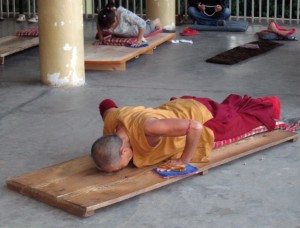The following is respectfully quoted from “The Jewel Ornament of Liberation” by Gampopa as translated by Khenpo Konchog Gyaltsen Rinpoche:
First, One should Avoid Distraction. The avoidance of distraction is called solitude, where one is isolated from physical agitation and the mind is isolated from discursive thoughts. Engaging in the Conduct of Bodhisattvas says:
But through solitude of body and mind
No discursive thoughts will occur.
One should understand that isolation from physical agitation is discussed in six topics:
- the primary characteristic of agitation
- the cause of agitation
- the faults of agitation
- the primary characteristics of solitude,
- the cause of solitude, and
- the good qualities of solitude
1. The Primary Characteristic of Agitation is to be scattered because of being in the midst of your children, spouse, retinue, and wealth.
2. The Cause of Agitation is attachment to such sentient beings as children, spouses, retinue, and so forth; attachment to wealth such as food, material things, and so forth; and attachment to fame, praise, and so forth. These things will not bring avoidance of agitation. It is said:
Worldly life is not forsaken because of attachment [to people]
And due to craving for material gain and the like.
3. The Faults of Agitation should be understood generally and particularly. Concerning general agitation, the Sutra Requested with Extreme Sincerity says:
Maitreya, there are twenty different types of defects. What are these twenty? Body is unrestrained, speech is unrestrained, and mind is unrestrained. Gross afflicting emotions are rampant. Even worldly speech is affected. The maras have a chance to triumph. Mindfulness is lacking. Calm abiding and special insight cannot be achieved. And so forth.
In particular, you will not achieve enlightenment with the fault of attachment to sentient beings. The Moon Lamp Sutra says:
One who fully attends sensual objects,
Craves children or spouse, and
Clings to the home that should be rejected
Will not achieve enlightenment at all.
Engaging in the conduct of a Bodhisattva says:
Through being attached to living beings
I am completely obscured from the perfect reality.
Therefore, you should avoid these attachments. As it is said:
It also cannot benefit me
And I cannot benefit it.
Therefore, stay a long distance from this childishness.
The beneficial effects of avoiding this. The Moon Lamp Sutra mentions:
Having renounced attachment to child and spouse,
Being afraid of the home and renouncing it,
The achievement of enlightenment will not be so difficult.
There are also two defects of attachment to wealth and fame. Wealth and fame cannot be held forever and they will create a predicament. Engaging in the Conduct of a Bodhisattva says:
Whatever fame and renown I have amassed
Have no power to accompany me.
Second, it is said:
By the piling up of whatever objects
You are attached to,
Misery a thousandfold will ensue.
4. The Primary Characteristic of Solitude is to be free from these agitations.
5. The Cause of Solitude is to abide in a monastery by yourself. What is a “monastery?” Being in a cemetery, by the forest, cave, or plain. 500 armspans is an earshot. A place which is the distance of an ear-shot from a town is called a monastery. The Treasury of Abhidharma says:
500 armspans is an earshot; that place is called a monastery.
6. The Good Qualities of Solitude. Escaping from agitation and staying in monasteries for the sake of enlightenment and of sentient beings has many good qualities:
- it is an excellent offering to the Buddhas
- one will renounce samsara, will be from the eight worldly concerns, and will not encourage the afflicting emotions, and
- meditative concentration will arise.
a) The First One. Taking seven steps toward a monastery with the motivation to stay there with bodhicitta for the benefit of sentient beings pleases all the Buddhas more than making offerings with the diversity of food, drink, flowers, and so forth. The Moon Lamp Sutra says:
The Victorious One is not honored
By offerings of food and drink,
Or, likewise, of clothes and flowers, incense and garlands.
One will make greater merit by
Taking seven steps toward a monastery
In order to benefit sentient beings
By renouncing evil, composite phenomena.
b) The Second One. Concerning renunciation of samsara, freedom from the eight worldly concerns, and the discouragement of afflicting emotions, that same sutra says:
Likewise, one will renounce all composite phenomena,
One will have no desire for all the worlds,
And afflicting emotions will not increase.
b) The Third One. The principle objective is to increase meditative concentration quickly. The same sutra says:
Be detached from village and city,
Always attend to forest and isolation,
Always be alone like a rhinoceros.
Before long, you will achieve supreme meditative
concentration.
This explains how to remain isolated from physical agitation.




